Do you have a question about the Triumph 2012 Tiger 800 and is the answer not in the manual?
Explains how to navigate and interpret the manual's structure and symbols.
Details symbols for safety instructions, potential damage, and important operational points.
Highlights high voltage hazards and precautions for wearers of pacemakers.
Lists hazardous liquids and substances used in vehicles, emphasizing safe handling and storage.
Advises on protecting skin from oils and handling chemicals safely.
Covers crucial safety points for jacking, lifting, and precautions against damage to the motorcycle.
Guidelines for safe handling of electrical and electronic components to prevent damage and ensure safety.
Explains the relationship between voltage, current, and resistance in electrical circuits.
Explains the purpose and types of circuit diagrams used in the manual.
Describes methods for tracing electrical faults by following circuit diagrams.
Details the alternator, charging system components, and diagnosis procedures.
Explains the electric start system and basic fault finding for the starter motor.
Stresses the importance of maintenance for safety and reliability, noting environmental factors.
Outlines maintenance tasks and their required intervals based on odometer readings or time.
Detailed illustration of cylinder head components, including valves and their arrangement.
Describes the construction of the cylinder head, camshafts, and the hydraulic tensioner system.
Provides instructions for the removal and installation of the camshaft cover.
Covers the removal and installation of the camshaft drive chain tensioner.
Explains how valve clearances are affected by wear and how to measure and adjust them.
Detailed illustration of the clutch assembly components, including plates and springs.
Covers clutch cable removal, inspection, and assembly/adjustment.
Details the procedure for checking friction and steel plate thickness and condition.
Explains how to measure clutch pack height and build a new pack correctly.
Diagram showing the crankshaft, connecting rod, piston, and liner components.
Covers crankcase disassembly, assembly, and critical cautions for mating faces.
Provides instructions for connecting rod removal and installation, emphasizing bolt usage.
Guides through piston removal, inspection, and wear checks, including ring groove clearance.
Diagram showing the components of the balancer shaft assembly.
Explains the function of the balancer and provides removal instructions.
Details checks for gear teeth, bearings, springs, and overall balancer condition.
Step-by-step guide for assembling and installing the balancer, including gear alignment.
Illustrates the components of the input and output shaft assemblies.
Covers the removal and installation of the selector shaft and related components.
Details the removal and inspection of selector forks and the selector drum.
Instructions for removing and installing the input and output shaft assemblies.
Explains how oil flows from the sump through various components for lubrication and cooling.
Describes the function and operation of the oil-to-coolant heat exchanger.
Specifies the correct engine oil type, additives, and handling precautions.
Details the procedure for checking engine oil level using the sight glass.
Step-by-step guide for draining oil, replacing the filter, and refilling the engine.
Covers the removal, inspection, and assembly of the oil pump.
Specifies fuel types and octane ratings required for the motorcycle, including warnings about additives.
Provides brief explanations of common terms and abbreviations used in the fuel system section.
Overview of the electronic system controlling ignition and fuel delivery, including sensor inputs.
Describes the function and location of various sensors used by the engine management system.
Details the functions and locations of electronic and electro-mechanical actuators controlled by the ECM.
Explains the electronic immobiliser system, its components, and diagnostic procedures.
Information on the accessory TPMS, its system description, and owner precautions.
Covers system diagnostics, fault detection, and interpretation of diagnostic trouble codes.
Explains the function of the crankshaft position sensor and provides pinpoint tests for troubleshooting.
Diagram showing the layout of the cooling system components.
Details the type of coolant used, its properties, and safety precautions.
Instructions for checking coolant level in the expansion tank when the engine is cold.
Step-by-step guide for draining and refilling the cooling system.
Covers thermostat removal, inspection, and installation procedures.
Exploded view of the swinging arm and its associated components.
Information on drive chain maintenance, including lubrication, adjustment, and wear inspection.
Detailed steps for adjusting chain free-movement and tightening related fasteners.
Procedures for removing, inspecting, and installing the rear suspension unit.
Instructions for the removal, inspection, and assembly of the swinging arm.
Step-by-step guide for replacing the drive chain using specialized tools.
Diagram showing the components of the front fork for the Tiger 800.
General overview of the front suspension system and periodic inspection requirements.
Guidance on examining front forks for damage, oil leaks, and smooth operation.
Detailed instructions for the removal and installation of the front forks.
Procedures for draining and refilling the front fork oil, including level measurement.
Covers checking and adjusting the headstock bearings for proper play.
Step-by-step instructions for removing headstock bearings.
Crucial safety advice for brake system maintenance, including fluid handling.
Procedure to check and adjust the front brake fluid level.
Instructions for changing brake fluid, including bleeding procedures.
Steps for removing, inspecting, and installing front brake pads.
Details on front brake caliper disassembly, inspection, assembly, and installation.
Information on checking front brake disc wear and removal/installation.
Instructions for removing, disassembling, inspecting, assembling, and installing the front brake master cylinder.
Specific procedure for bleeding front brakes on ABS-equipped models.
Covers removal, installation, and troubleshooting for the front ABS wheel speed sensor.
Procedures for removing and installing the ABS hydraulic modulator and related components.
Information on using the diagnostic tool to retrieve ABS system data and troubleshoot faults.
Discusses tyre types, markings, and warnings regarding tubeless and tubed tire usage.
Provides correct on-road and off-road tyre pressure specifications for different models.
Guidelines for checking tyre wear, inspecting wheels, and the importance of proper maintenance.
Instructions for the removal and installation of the front wheel assembly.
Procedures for removing and installing the rear wheel assembly.
Covers removal, inspection, and installation of front wheel bearings.
Details the process for removing, inspecting, and installing rear wheel bearings.
Instructions for removing, inspecting, and installing the final drive components.
Diagram showing the motorcycle's frame and mounting points.
Exploded view of the cockpit assembly and mounting hardware for the Tiger 800.
Illustration of lower body panels and sump guard components.
Diagram showing the rear body panels and their associated fixings.
Exploded view of the sidestand assembly, including springs and fixings.
Exploded view of the front mudguard components for the Tiger 800.
Procedures for removing and refitting the rear seat assembly.
Instructions for removing and installing the lower radiator panels.
Covers the removal and installation of the radiator infill panels.
Detailed steps for removing and installing the cockpit assembly.
Steps for removing and installing the sump guard.
Diagram showing the components of the instrument cluster.
Illustration of the headlight assembly components.
Covers battery removal, refitting, and safety precautions.
Step-by-step guide for safely removing the motorcycle battery.
Procedure for commissioning and charging a new battery.
Information on fuse identification and replacement procedures.
Instructions for removing and installing the instrument pack.
Circuit diagram and wiring colours for the starting and charging system.
Electrical schematic for the engine management system on non-ABS models.
| Engine Type | Liquid-cooled, 12 valve, DOHC, in-line 3-cylinder |
|---|---|
| Displacement | 799 cc |
| Bore x Stroke | 74.0 x 61.9 mm |
| Compression Ratio | 11.1:1 |
| Fuel System | Multipoint sequential electronic fuel injection |
| Final Drive | O-ring chain |
| Clutch | Wet, multi-plate |
| Gearbox | 6-speed |
| Frame | Tubular steel trellis frame |
| Front Suspension | Showa 43mm upside down forks, 180mm travel |
| Rear Suspension | Showa monoshock with adjustable preload, 170mm rear wheel travel |
| Front Brakes | Twin 308mm floating discs, Nissin 2-piston sliding calipers |
| Rear Brakes | Single 255mm disc, Nissin single piston sliding caliper |
| Front Tire | 100/90-19 |
| Rear Tire | 150/70 R17 |
| Wheelbase | 1555 mm |
| Fuel Tank Capacity | 19 litres |
| Wet Weight | 210 kg |
| Max Power | 95 PS (70 kW) @ 9300 rpm |
| Max Torque | 79 Nm @ 7850 rpm |
| Exhaust | Stainless steel 3 into 1 system with high level silencer |
| Front Wheel | Cast aluminium alloy 19 x 2.5 in |
| Rear Wheel | Cast aluminium alloy 17 x 4.25 in |
| Dimensions | 2215mm |
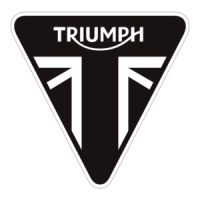

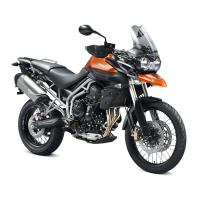



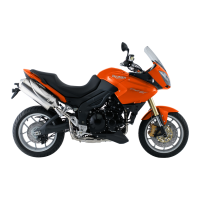
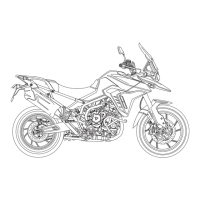
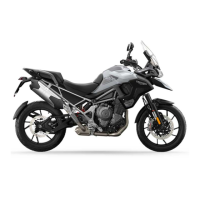
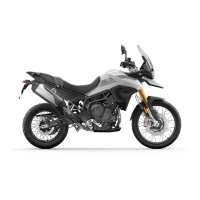
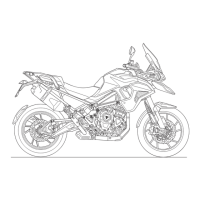

